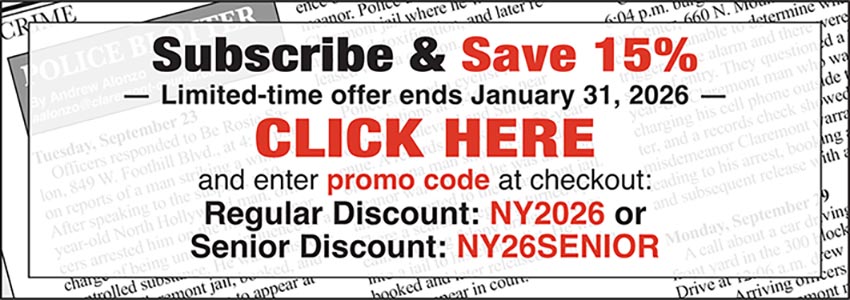VIEWPOINT: SRO and the Police Commission
I always thought I knew what racism looked like. I believed that if I saw it firsthand, I would be able to identify it and call it out. But what if racism doesn’t look the way you thought it would? What if it’s not overt but veiled in an attempt to uphold the status quo? How then do you put your finger on the exact words that made your hair stand and a chill go down your back? I am not sure if I know the answer to my own question, but I will give it a try.
For the last year, students have been demanding the removal of the School Resource Officer from Claremont schools. They have called in to City Council meetings, school board meetings, police commission meetings, held protests and told their stories hundreds of times.
In response, the Police Commission created an Ad Hoc committee to dive into the issue and bring a recommendation to the Commission for a vote. Last Thursday, they presented their findings and recommendation to remove the SRO effective June 2022. They recommended that the Council create a working group made up of stakeholders from across the community to create a student safety program that works for everyone and is effective and data driven. This is where things began to take a turn.
Racism isn’t just hateful language. It can be a twist and turn of facts to negate the needs of people of color. It can be deflection that attempts to divert attention away from talking about racial inequities in the data or lived experience.
Data reveal that the SRO disproportionately cites and arrests Black and Brown students as compared to their percentage of the student body. Numerous peer-reviewed studies conclude that SRO programs have no discernable benefits, and in fact have been found to be detrimental to students of color.
But when presented with facts, Chief Vander Veen used a common strategy of those obstructing progress —she ignored the data and instead relied on fear to drive the vote, implying the whole community would be less safe without the SRO.
Commissioner Mason said the data was not statistically significant and that you could not conclude that there are racial disparities. Commissioner Huang claimed that the recommendation was more of an emotional plea than a report. Commissioner Strash said he wanted data from Southern California, not national studies. Chief Vander Veen even went as far to imply that she would not be comfortable remaining Chief if the SRO position is removed.
So why are these responses racist?
When we allow white people in positions of power to override the experiences of people of color and clear evidence of racial inequities, we uphold structural racism. When we dismiss facts as “emotional pleas”, it reflects a paternalistic attitude toward the lived experience of people of color in an attempt to discredit their argument. When we challenge the validity of facts that have been studied across the nation, we reveal our sense of privilege and perceived communal exceptionalism. When a police chief counters a report presented in good faith with a threat to resign should the decision not go her way, that is a pressure tactic that plays on the fears of citizens.
When a commissioner claims to be listening to the majority, but that majority is and always has been white, they are upholding racist practices in our community. The students and data have made it clear – the SRO negatively impacts mental health and criminalizes Black and Brown students. If that is not enough to convince the commission to recommend the removal of the position, they are not fit to represent this community. They are not part of the solution; they are part of the problem.
Noah Winnick
Cofounder of Claremont Change










0 Comments